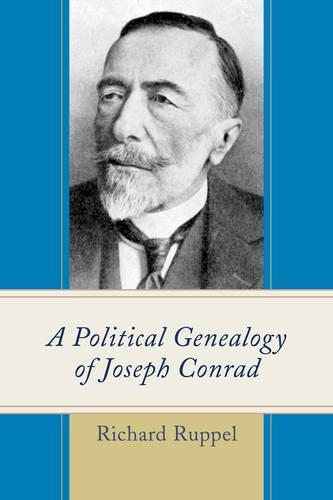
A Political Genealogy of Joseph Conrad
(Paperback)
Available Formats
Publishing Details
A Political Genealogy of Joseph Conrad
By (Author) Richard Ruppel
Bloomsbury Publishing PLC
Lexington Books
14th November 2016
United States
Classifications
Professional and Scholarly
Non Fiction
Right-of-centre democratic ideologies and movements
320.5092
Physical Properties
Paperback
166
Width 151mm, Height 230mm, Spine 12mm
245g
Description
Jzef Teodor Konrad Korzeniowski, who gradually transformed himself into the English writer, Joseph Conrad, was a mercurial personality. He left Poland for the sea, though he had no experience with salt water. He left the Polish language for French, and then for English. He attempted suicide at the age of twenty. He invested in various schemes and lost his inheritance. He married an English typist nearly sixteen years younger than himself with whom he had nothing in common. He worked as a writer though he made no money through all the years of his most important work and though he experienced terrible psychological breakdowns after completing each novel. He was warm with his friends, ingratiating with influential strangers, but also intensely irritable and easily offended. His work is as varied and changeable as his personality, from his first two, emotionally intense Malay novels, to the stolid and confident Nigger of the Narcissus and Typhoon; from the coldly ironic Outpost of Progress to the nightmarishly subjective Heart of Darkness; from the leisurely, panoramic visions of Nostromo to the tautly nervous, claustrophobic ironies in The Secret Agent. Despite the extraordinary thematic and tonal range of his work, critics have imposed a stable political perspective on his fictionmost often an organic conservatism, influenced by his Polish background. This is understandable; until recently, a critics role has been to impose order on an artists creations. The approach in this book is different. Drawing on the work of Michel Foucault and Jean-Francois Lyotard, especially on the latters critique of what he called the grand narrative, A Political Genealogy of Joseph Conrad shows how Conrads politics were always radically contingent on audience, contemporary events, and, especially, genre. While the political perspective in each of his stories and novels may be more-or-less coherent and consistent, there is no consistency throughout his work. A Political Genealogy of Joseph Conrad is the first book devoted exclusively to Conrads politics since the 1960s.
Reviews
In A Political Genealogy of Joseph Conrad, Ruppel proposes a much-needed critical intervention into Conrads complicated and ambivalent engagement with political discourse and ideology, particularly in the major novels. Surveying the criticism surrounding Conradian politics, Ruppel finds that previous critics unjustly pigeonholed Conrad as a profoundly conservative, even reactionary, writer. Arguing vigorously against this time-honored truism, Ruppel contends that the migr polyglots political ideas and leanings were 'radically contingent,' particularly in relation to the audience he envisioned for himself. In tightly structured arguments in successive chapters on the major works, Ruppel reveals Conrad as politically protean rather than staunchly conservative. Far from a hindrance or an impediment to his aesthetic designs, his political mutability allowed him to throw into question grand narratives that underlie and structure political relations. This necessary, useful volume offers a fresh and engaging approach to the writers complex novelistic expressions of the political. Summing Up: Recommended. Upper-division undergraduates through faculty. * CHOICE *
Ruppel provides a substantial analysis that nicely weaves historical texts and figures with Conrad's fiction and nonfiction.... Ultimately, A Political Genealogy of Joseph Conrad offers an insightful overview of not only Conrad's works, but also the varying factors that influenced Conrad throughout his writing career, and it adeptly supplements interpretations of Conrad's shifting and ambiguous political temperaments. * Joseph Conrad Today *
A Political Genealogy of Joseph Conrad is direct, clearly written, and stylistically effective. . . .This is a work well worth reading and one with which Conrad scholars in particular will want to be familiar. * English Literature In Translation *
A very intelligent, insightful analysis of the contradictions of Conrads politics that refuse to be contained by a single grand narrative. Gracefully written, cogently argued, and well-researched, this book will be useful to scholars and students alike. -- Paul B. Armstrong, Brown University
To the bracing iconoclasm already known to readers of Richard Ruppel's past work, A Political Genealogy of Joseph Conrad here adds a deft and dexterous way with textual subtlety, and a feel for how a genre can end up encouraging a political tendency all its own. In Ruppel's capable hands the reader sees how the adventure story may shadow forth Thomas Carlyle (what is Lord Jim's title character but the failed draft of a Great Man), while the broader social canvas of epic will summon the specter of Marx (as in Nostromo's tale with "material interests" for its anti-hero). Readers nowadays expect the political introduction to a writer to bring him out from one or another door, as liberal good guy or reactionary oppressor. In his well-crafted sampler of texts, it is Ruppel's refreshing gesture to bring Joseph Conrad out from Door Number Three, as indeed a writer. What he leads us to realize, with a mastery of both style and substance, is that Conrad the writer, never really a political philosopher, was always a political animal down to the ground. Ruppel supplies that essential bit of truth for which the reader, especially in this era, has probably forgotten to ask. -- Mark Conroy, Ohio State University
Author Bio
Richard Ruppel is a professor of English at Chapman University.
